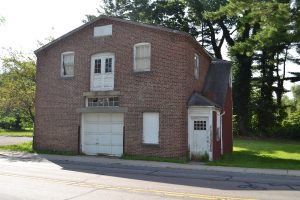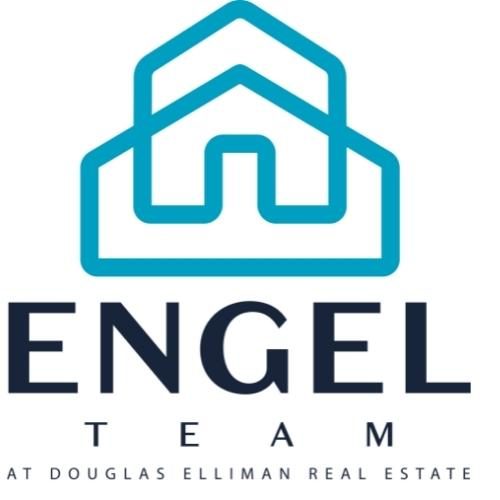Mead Park barn demolition plan remains in place after Council hears pitch to save it
BY GREG REILLY

Even though the Town Council had no authority to take any action, they spent an hour-and-a-half of their four-hour meeting Wednesday night revisiting the pros and cons of the plan to open up the vista to Mead Park by removing the decrepit brick barn on Richmond Hill Road.
“The Town Council cannot rescind money,” Council Chairman John Engel told his colleagues and the audience of about 40 citizens, referring to the budget allocation the Council authorized in May for demolition of the brick barn. “Once we approve money we don’t take it back.”
He said the reason for that is to avoid any appearance or practice of overtaxing people and then holding onto the money.
Furthermore, Engel told the meeting, “We are not a land use authority.”
The Town of New Canaan, which is the owner of the brick barn at the north end of the Town’s Mead Park, has applied to its Building Department for a demolition permit, which may be approved around Oct. 25 at the end of a 90-day waiting period set by the Historical Review Committee. The waiting period allows for parties to come forward with alternative plans to demolition of buildings 50 years old or older.
“Ultimately the decision is for the Board of Selectmen to spend the money allocated” for the demolition, Engel said. “We don’t have a vote.”
First Selectman Kevin Moynihan sat through the Council meeting including a presentation made to the Council by the New Canaan Preservation Alliance that wants to lease the Mead Park barn, finance and conduct restoration, and then sublease it to non-profit organizations. After the meeting Moynihan told reporters, “Nothing is changing.”
In other words, the plan to demolish remains in place, Moynihan confirmed the day after the meeting.
Closure
Engel said he was asked by multiple fellow council members before the meeting, Steve Karl among them, why the brick barn was on the agenda since a decision was made in May and no action may be taken by the Council at this time. Engel told the meeting that is was important to have the group make a presentation and to “get some closure.”
The building has been unused for at least 20 years, and the Town Council in 2010 voted to demolish the building. At that time costs to demolish were reportedly more than $200,000 — more than the Town wanted to spend. Presently the Town has a cost estimate of $65,000, and that is what has been authorized.
New preservation plan
The restoration plan presented by New Canaan Preservation Alliance (NCPA) Co-Founder Robin Beckett and board members Charles Robinson, Carl Rothbart and Rose Scott Long Rothbart calls for the Town to agree to a long-term lease of the barn to NCPA, and NCPA then conducting a four-year restoration plan with estimated hard costs of $350,000. Additional costs for fees and services would be donated by NCPA board member who are professionals.
The NCPA’s proposed source of funds would be $262,500 from a series of $50,000 grants from the Historic Restoration Fund at the State Historic Preservation Fund and a tax credit program. The balance of $87,500 is proposed to be paid by NCPA, and Beckett told the meeting that they have “a little more than half” of that the amount now in hand.
The NCPA proposal calls for a four-year project that would include site cleanup, hazardous material remediation, restoring original materials, replacing missing materials, full restoration of interior and exterior walls, floors and ceilings, and more.
Yet another part of NCPA’s offer, which is conditioned upon their plan being adopted, is to help the Town learn how to get building rehabilitation grants from various sources for Town projects coming up in the future.
Robinson urged the Council to eliminate the dollars for demolition and give an ok for what he called a “reasonable, feasible, prudent alternative to demolition.” He said also that NCPA has a bona fide tenant lined up.
During his pitch to the meeting, Robinson used a rhyming term meant to entice the Council, but the team of presenters later took it back. Robinson said the Town should allow NCPA to turn what is now a “distraction” into an “attraction.”
Distraction
The term “attraction” raised objections by at least two speakers who said it is not a good idea to attract more people to that building, which is separated from Richmond Hill Road by only a sidewalk.
A resident of 71 Richmond Hill who spoke to the meeting said the street already has a lot of traffic with speeding and people passing school buses. More traffic is not desired.
Jack Flinn of 123 Richmond Hill, who happens to be also a Planning and Zoning commissioner, said the Town would never build a building like the barn where it is in a residential neighborhood on one side with a park on the other. Attracting people to the building, for example if used by non-profits, is not what he would like to see. He suggested that people who want to invest in the building can move it to another location in town.
Later in the meeting the presenters said what they meant to convey with their wording is their intent to the building and make it “attractive,” not an attraction.
Embellishing that point, one of the public speakers, a resident name Jennifer Frazier who said she has a degree in architectural history, said that a restored structure could provide “sparkle” and improve the neighborhood.
Speakers split
In total, there were 15 speakers who addressed the Town Council about the Mead Park barn. Eight speakers were opposed to the planned demolition. Four of them were the NCPA presenters, one was another co-founder of the NCPA, Mimi Findlay, and three were general residents.
Seven speakers favored the Town’s plan to demolish the barn. Amy Murphy Carroll, a resident who is also a member of the Board of Finance and a past co-chairman of the Building Evaluation and Use Committee, said she supports “what has been approved — the demolition.”
She said that projects that come to the Town “fully funded, money in hand” might be considered; “I don’t see money in hand.”
The Town has an extensive capital plant, she said, and “another building with another lease” is not what the Town needs.
Even if the building were restored it would still block the vista into the park, Carroll said.
Parks and Recreation Commissioner Francesca Segalas spoke for the commission: “We support demolition,” she said. “We’ve been doing a lot of improvements in Mead Park” and do not want the brick barn in the middle of the view to the pond.
Others in support of the Town’s plan to demolish the barn included Laszlo Papp, who pointed out that he has worked long and hard for historic preservation in New Canaan as a chairman and member of the Planning and Zoning Commission. He said that a building does not have to be very special to be on the state’s Register of Historic Places, and “this building does not rise to the level of the architecture being significant.”
“No responsible Town body can or should approve a presentation like this,” Papp said. “There is nothing on the table. The financing is all promises.”
“Good will was there; help was there,” he said of the NCPA, but he said that in the end maintenance would be done by taxpayers.
The president of the condominium association at 123 Richmond Hill Road, a woman named Kim, said she wants the brick barn to be gone because its presence “is taking away from the park and home values.”
“I appreciate the plan, but it is late,” she said. She agrees with Papp by expecting that at some point in the future the liability to maintain the building will fall back to the Town.
Adding to the voices of those opposed to the demolition were Sarah Robinson and Peter Hanson. Said Sarah: “I don’t understand why the Town would want to spend $65,000 to take down a building when they have a dedicated group to improve and finance it with groups interested in renting.”
“As a taxpayer, I don’t want $65,000 spent to demolish that building,” she said.
Hanson expressed this thanks to fellow citizens in the past who put their energy into restoring Town buildings that fell into disrepair. He named the Powerhouse Theatre and Carriage Barn in Waveny Park and Gores Pavilion in Irwin Park as properties that some wanted to tear down but were eventually restored for the good of the town.
As resigned as Chairman Engel was in being without the power to take action at this time, he said, “We’re still trying to figure out preservation…. The Town benefited today from this presentation.”
